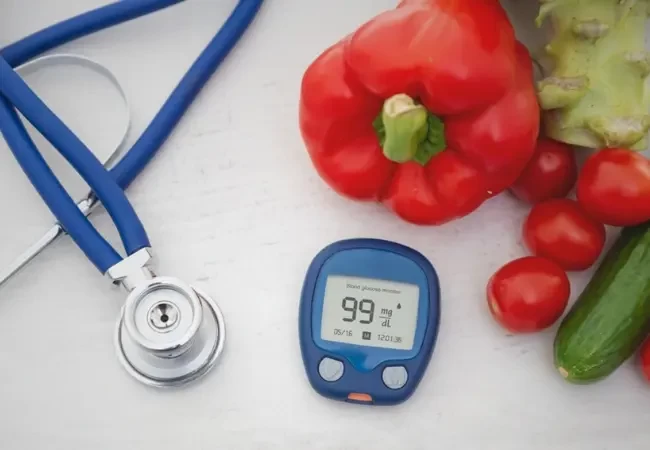Blog
Diagnosing
Diabetic Nephropathy

How to Diagnose Diabetic Kidney Disease?
 Medically reviewed by: Dr. Tom Babu, Medical Director - Written by Jasni Salim - Updated on 03/09/2024
Medically reviewed by: Dr. Tom Babu, Medical Director - Written by Jasni Salim - Updated on 03/09/2024Diabetic nephropathy which is also known as diabetic kidney disease is a serious problem for people with type 1 and type 2 diabetes. In the U.S., about 1 in 3 diabetics develop this condition. It makes it hard for the kidneys to do their job of cleaning waste and extra fluid from the body.
The best way to prevent or slow down kidney damage is to live a healthy lifestyle and control diabetes and blood pressure. Over time diabetic nephropathy can harm the kidneys more and more. Getting treatment early will help prevent or slow down the damage and reduce the risk of serious problems.
If diabetic kidney disease gets worse, it will lead to kidney failure which is very dangerous. In this case, people may need treatments like dialysis or a kidney transplant to survive. Taking care of your health is very important to avoid these issues.
Diabetic Nephropathy Causes
Diabetic nephropathy is a common problem for people with type 1 and type 2 diabetes. If diabetes is not controlled well, it can harm the blood vessels in the kidneys which clean waste from the blood. This damage can lead to high blood pressure which can further hurt the kidneys by putting extra pressure on them. It is important to manage diabetes to protect the kidneys and keep blood pressure normal.
Risk Factors
If you have diabetes, certain things can increase your chances of getting kidney problems.
- High blood sugar that is not controlled is called hyperglycemia.
- High blood pressure that is not controlled is called hypertension.
- Smoking is harmful to your health.
- High cholesterol in the blood is a problem.
- Being overweight is a health risk.
- Having family members with diabetes or kidney disease increases your risk.
Diagnosis of Diabetic Kidney Disease
- Diagnosing diabetic nephropathy is usually done during regular checkups for diabetes. If you have type 2 diabetes or have had type 1 diabetes for over five years, make sure to get tested every year. These routine screening tests might help you in diagnosing diabetic nephropathy.
- Urinary albumin test: This test checks for a protein called albumin in your urine. Normally, kidneys keep albumin in the blood. High levels of albumin in urine may mean the kidneys are not working properly.
- Albumin/creatinine ratio: This test compares the amount of albumin to creatinine in a urine sample. Creatinine is a waste product that healthy kidneys remove from the blood. This ratio will help to assess kidney function.
- Glomerular filtration rate (GFR): This test measures creatinine in the blood to see how fast the kidneys filter it. A low GFR indicates that the kidneys may not be functioning well.
These tests will help doctors understand how well your kidneys are working.
Other diagnostic tests might include:
- Imaging tests: It helps doctors see the kidneys. X rays and ultrasounds show the size and shape of the kidneys. CT and MRI scans check how well blood is flowing in the kidneys. You might need other tests too.
- Kidney Biopsy: A kidney biopsy is a procedure to take a tiny sample of kidney tissue for testing. First, doctors use a local anesthetic to numb the area. Then, a thin needle is gently inserted to remove small pieces of kidney tissue. This helps doctors understand what is happening in your kidneys.
Symptoms
At first, diabetic kidney problems may not show any signs. As the condition gets worse, you might start to notice symptoms like:
- High blood pressure that is difficult to manage
- Swelling in feet, ankles, hands or around the eyes
- Urine that looks foamy
- Trouble thinking clearly or feeling confused
- Difficulty breathing or feeling short of breath
- Not feeling hungry
- Feeling sick to the stomach or vomiting
- Itchy skin
- Feeling very tired and weak
Treatment
The first thing to do after diagnosis of diabetic kidney disease is to manage diabetes and high blood pressure. This involves healthy eating, staying active, making lifestyle changes and taking medications. Keeping blood sugar and blood pressure under control will help stop kidney problems and other health issues from getting worse. Taking these steps can make a big difference.
When to See a Doctor?
If you have signs of kidney problems, see your doctor. If you have diabetes, go for check ups every year or as your doctor advises. These visits help test how well your kidneys are working. Regular check ups are important to keep your kidneys healthy.
Conclusion
How well people with diabetic nephropathy do depends on how well they control their blood sugar and blood pressure. The sooner they get treated, the better their chances. Starting treatment early can slow down or stop kidney damage. People with diabetes should go for regular check-ups as their doctor suggests and take steps early to help protect their kidneys from getting worse.
At Silverline Hospital, our expert nephrologists and diabetologists focus on treating diabetes comprehensively, not just with medicines or insulin. We provide full support to help our patients live healthy lives. Our top diabetologists in Kochi offer personalized diabetes care, ensuring that each patient receives the attention and diabetes treatment they need. Our goal is to help everyone manage their diabetes and related kidney disease effectively.

More Blogs
-

Struggling with Erection or Early Ejaculation? Here's How to Get Help
Struggling with erectile dysfunction or premature ejaculation? Learn common causes, treatments, and how to seek professional help with confidence.
-

When Should Diabetics Eat? Expert Tips on Meal Timing and Blood Sugar Control
Learn how diabetics can optimize meal timing to better control blood sugar. Expert tips for healthier, more balanced living.
-

Facing the Fear: Understanding Psychological Erectile Dysfunction Before Marriage
Discover the causes and solutions for psychological erectile dysfunction before marriage. Gain insight, support, and confidence for a healthy relationship.
-

Why Overweight Individuals Should Embrace Early Dinners
Ready to lose weight smarter? See why early dinners are a game-changer for overweight individuals aiming for lasting health and weight control.
-

Overweight? Start with This One Powerful Lifestyle Change
Struggling with weight? Most of us eat our heaviest meal of the day at night, usually after 9 or even 10 PM.


 Home
Home  Booking
Booking
 Chat Now
Chat Now  Call Us
Call Us